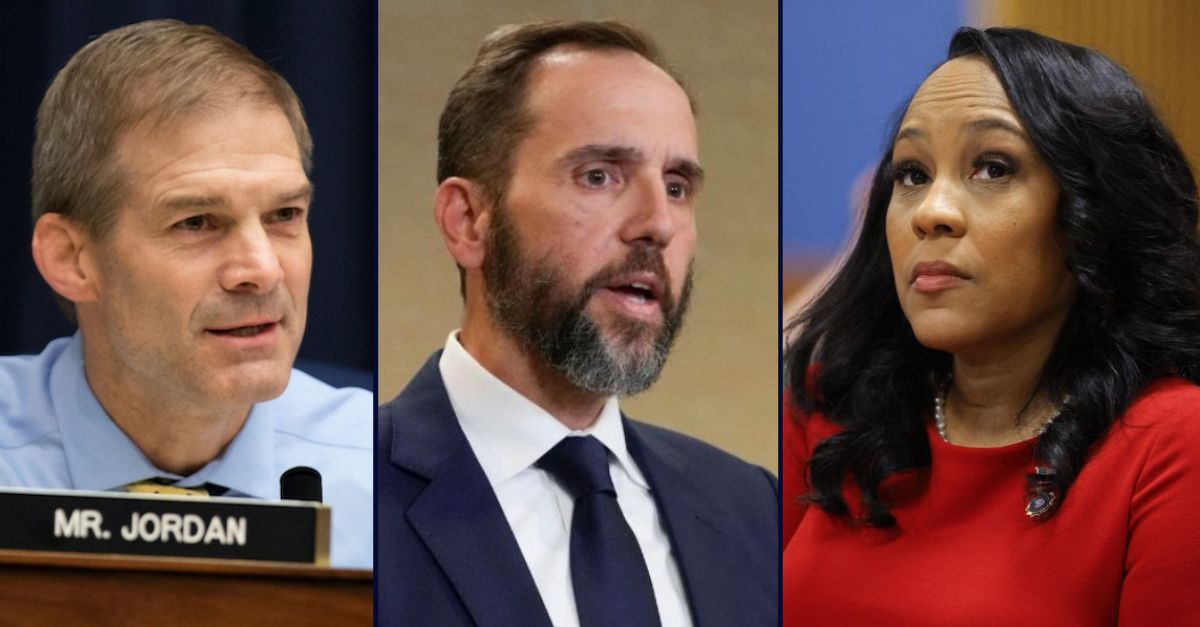
Left: WASHINGTON, DC – JULY 12: Rep. Jim Jordan (R-OH) asks Deputy Assistant FBI Director Peter Strzok a question on July 12, 2018 in Washington, DC. (Photo by Alex Edelman/Getty Images). Center: Jack Smith speaks about an indictment of former President Donald Trump, Aug. 1, 2023 (AP Photo/Jacquelyn Martin, File). Right: Fani Willis arrives during a hearing on the Georgia election interference case on Friday, March 1, 2024, in Atlanta (AP Photo/Alex Slitz, Pool).
Congressional investigators are giving Fulton County District Attorney Fani Willis a deadline to comply with document production requests related to her conversations with various federal authorities about investigations into President-elect Donald Trump.
The embattled Democratic Party prosecutor has until Dec. 9, to turn over any such files, according to a letter sent by House Judiciary Committee Chair Jim Jordan, an Ohio Republican, on Wednesday.
“The Committee on the Judiciary continues to conduct oversight of politically motivated prosecutions by state and local officials,” the letter reads. “To date, you have failed to produce all information responsive to these requests.”
The letter is the latest volley in a long and combative correspondence between Jordan and Willis that began well over a year ago.
The epistolary arguments began in August 2023, when the committee asked Willis for files related to her office’s “receipt and use of federal grant funds issued by the U.S. Department of Justice.”
Two additional letters asking for substantially the same materials followed in September and December of last year.
In January, of course, the district attorney’s fortunes began a long slide as several codefendants in the racketeering (RICO) and election subversion case against Trump sidelined the prosecution. This disruption — still ongoing — was made possible by Willis’ romantic relationship with since-axed, then-lead prosecutor Nathan Wade.
Willis — and Wade while he was still on the case — replied to Jordan’s requests on numerous occasions by decrying any notion of wrongdoing and categorizing the underlying allegations as little more than a political witch hunt intended to hamstring her prosecution.
In the end, Jordan’s efforts bore little fruit even as the RICO case flagged due to a combination of Willis’ personnel choices and her public defense of those choices in a speech at an historically Black church that cast her — and Wade’s — detractors as racists.
Still, the committee kept pushing for the documents.
In February, Jordan issued a subpoena for documents relevant to allegations the district attorney’s office “has misused federal funding.”
Willis wrote back in late February, seeking to contextualize the entire federal funds issue as the byproduct of a lawsuit filed by a disgruntled former employee who was “terminated for cause.”
At the same time, the district attorney’s office began responding to the subpoena by producing around three dozen documents. Additionally, Willis said her office would continue producing any such relevant documents to the committee on a rolling basis.
In March, Jordan sent Willis another letter, alleging the district attorney’s office had “failed to produce” responsive documents in response to five broad categories of requests.
For awhile there was radio silence in the spat.
Now, recent events are prompting Jordan to reach out again.
On Tuesday, a court in Georgia found Willis in violation of Peach State open records laws yet again.
This time, the violation occurred within the context of a lawsuit aimed at prying away information about the her and her office’s communications with special counsel Jack Smith and members of the since-defunct House select committee investigating the Jan. 6 attack.
In a 6-page order granting the plaintiff’s motion for default judgment, Fulton County Superior Court Judge Robert McBurney ordered the district attorney’s office to provide the requested documents and left open the possibility of forcing the state to pay attorneys fees.
In the underlying lawsuit, conservative government watchdog group Judicial Watch accused Willis, and Fulton County broadly, of making “likely false” representations about the retention of such documents.
Jordan’s latest letter frames the court’s order in the Judicial Watch case as a boon for his office’s own, related efforts.
From the congressional letter, at length:
After you failed to timely or sufficiently respond to Judicial Watch’s lawsuit, the Superior Court of Fulton County ordered you to “conduct a diligent search of [your] records for responsive materials within five business days of [the] Order,” and to provide Judicial Watch “with copies of all responsive records that are not legally exempted or excepted from disclosure.”
“Accordingly, the Committee hereby reiterates the requests contained in our August 24, 2023, and December 5, 2023, letters, including those relating to Special Counsel Jack Smith and the January 6 Select Committee, and expects your voluntary compliance with these requests,” the letter goes on. “If you are unable to locate responsive records, choose to withhold certain records from disclosure, or choose to redact information contained in responsive materials, please provide to the Committee in writing the reasons for doing so.”










